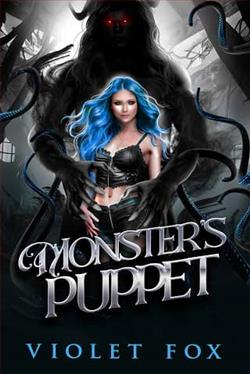Monster's Puppet by Violet Fox is a gripping exploration of identity, agency, and the blurred lines between love and manipulation. The novel thrusts readers into a dark, twisted world where the protagonist, a woman branded as a monster, grapples with the consequences of her actions—or rather, the actions of her masters. The blurb sets the stage for a haunting narrative that challenges our perceptions of sanity, morality, and the nature of love itself.
The story begins with the protagonist, who has spent three years in a cold cell, labeled insane after being accused of a horrific massacre. This initial setup is compelling; it immediately raises questions about her guilt and the reliability of her narrative. As the reader delves deeper, they discover that she is not the true architect of the violence attributed to her. Instead, she is a puppet, controlled by three shadowy beings with glowing eyes and claws for fingers. This concept of being a puppet is not just a metaphor for loss of control; it becomes a central theme that Fox masterfully weaves throughout the narrative.
One of the most striking aspects of Monster's Puppet is its exploration of the duality of the protagonist's existence. On one hand, she is a feared monster, a figure of terror in the eyes of society. On the other, she experiences a thrilling connection with her masters, who grant her power and exhilaration. Fox does an exceptional job of portraying this internal conflict, allowing readers to empathize with a character who is both a victim and a perpetrator. The protagonist's relationship with her masters is complex; it oscillates between fear, exhilaration, and a twisted sense of love. This dynamic raises profound questions about consent and autonomy, making the reader ponder the extent to which one can truly be held accountable for actions taken under coercion.
The narrative is further complicated by the introduction of the doctor, a character who represents a potential path to redemption and normalcy. The protagonist's feelings for her doctor add another layer of tension to the story. Here, Fox skillfully contrasts the chaotic, dark allure of her masters with the stability and care offered by the doctor. This love triangle is not just a plot device; it serves as a vehicle for exploring themes of choice and sacrifice. The protagonist is faced with an impossible decision: to escape with her masters, who embody both danger and excitement, or to embrace a more conventional life with the doctor, who symbolizes hope and healing.
Character development is a strong suit of Fox's writing. The protagonist is multi-dimensional, and her evolution throughout the story is both believable and compelling. As she grapples with her identity and the choices before her, readers witness her transformation from a passive victim to an active agent in her own life. This journey is fraught with emotional turmoil, and Fox does not shy away from depicting the protagonist's struggles with guilt, desire, and the longing for freedom. The supporting characters, particularly the doctor and the masters, are also well-developed, each representing different facets of the protagonist's psyche and desires.
Fox's prose is both lyrical and haunting, effectively capturing the eerie atmosphere of the protagonist's world. The vivid descriptions of her surroundings, combined with the psychological depth of the characters, create a rich tapestry that immerses the reader in the narrative. The pacing is well-executed, with moments of tension and introspection balanced beautifully, ensuring that the reader remains engaged throughout.
In terms of themes, Monster's Puppet delves into the nature of monstrosity, both external and internal. It challenges the reader to reconsider what it means to be a monster. Is it the act of violence that defines one as a monster, or is it the loss of agency and the manipulation by others? Fox invites readers to reflect on these questions, making the story not just a thrilling read but also a thought-provoking exploration of human nature.
Moreover, the novel can be compared to other works that explore similar themes of identity and control, such as The Girl with All the Gifts by M.R. Carey or Frankenstein by Mary Shelley. Both of these stories grapple with the concept of what it means to be human and the moral implications of one's actions. However, Fox's approach is unique in its focus on the psychological aspects of being a puppet, making it a standout in the genre.
Overall, Monster's Puppet is a captivating and thought-provoking read that challenges conventional notions of sanity, love, and monstrosity. Violet Fox has crafted a narrative that is both thrilling and deeply introspective, leaving readers questioning the nature of their own choices and the influences that shape them. The book's exploration of complex themes, coupled with rich character development and atmospheric prose, makes it a must-read for fans of psychological thrillers and dark fantasy.
In conclusion, if you are looking for a story that will keep you on the edge of your seat while also prompting deep reflection on the nature of identity and agency, Monster's Puppet is a compelling choice. Violet Fox has delivered a powerful narrative that resonates long after the last page is turned.
























Reviews 0
Post a Reviews: